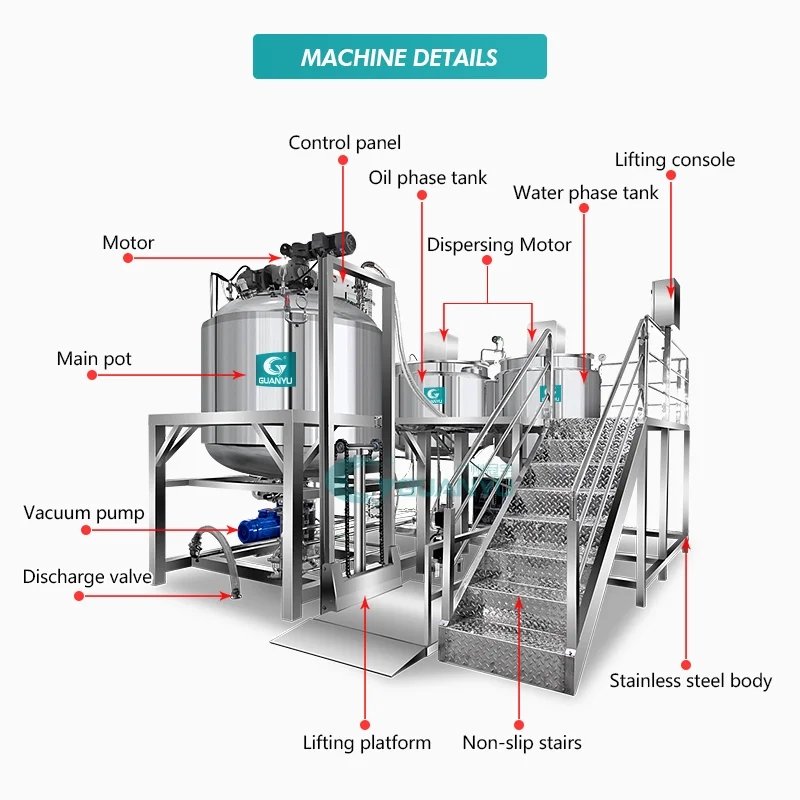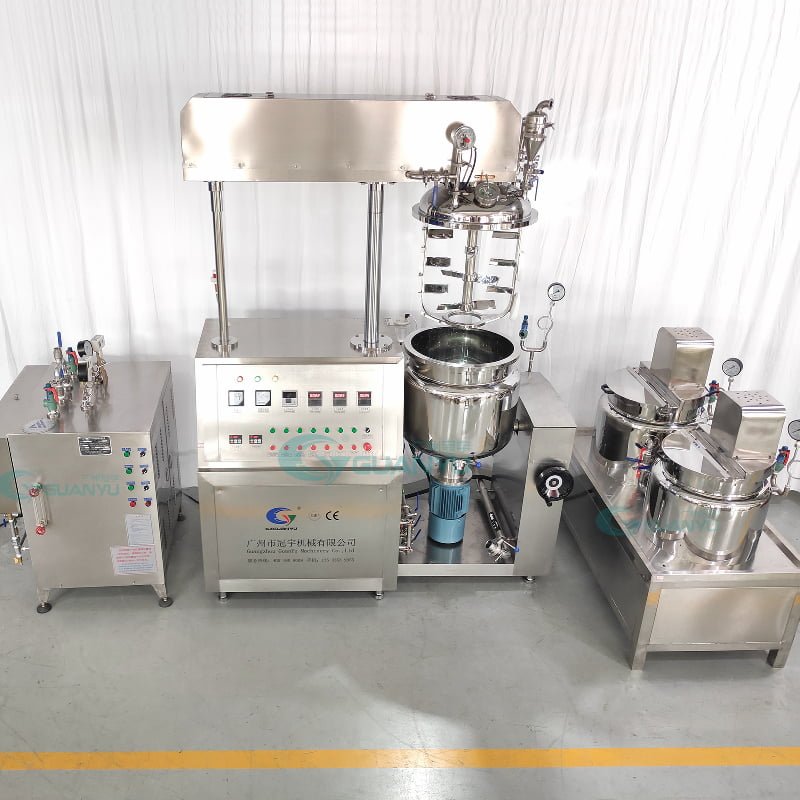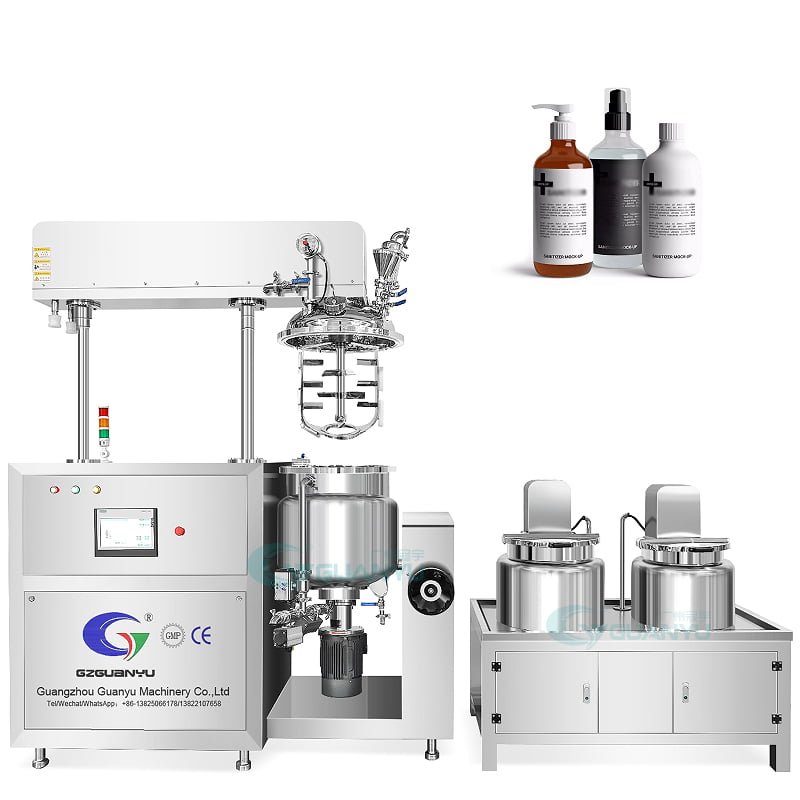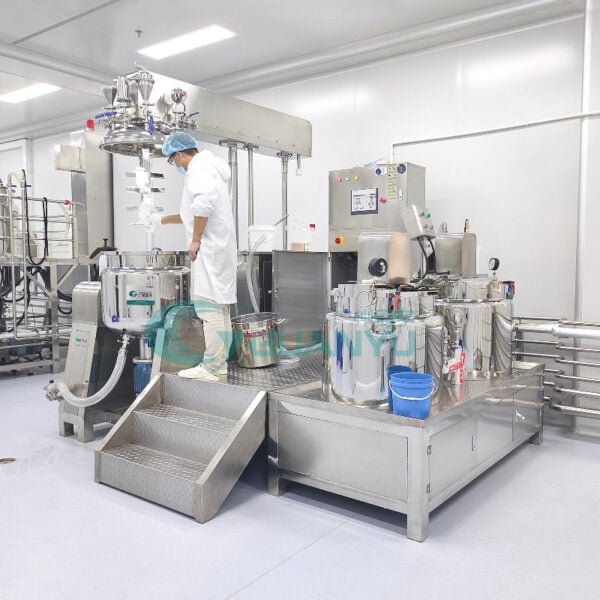Máquina homogeneizada: Una guía completa sobre
I. Introducción
1.1 ¿Qué es una máquina homogeneizadora??
Una máquina homogeneizadora es un equipo especializado diseñado para crear una mezcla homogénea reduciendo el tamaño de partículas o gotas dentro de un medio líquido o semisólido.. Este proceso se logra mediante la aplicación de intensas fuerzas mecánicas., como alta presión, cortar, o ondas ultrasónicas, descomponer las partículas y distribuirlas uniformemente por todo el medio.
1.2 La importancia de las máquinas homogeneizadoras en las industrias procesadoras modernas.
En las industrias de procesamiento modernas de hoy, Las máquinas homogeneizadoras desempeñan un papel crucial para lograr la consistencia deseada del producto., estabilidad, y calidad. Ya sea en la comida, productos cosméticos, productos farmaceuticos, o sectores biotecnológicos, Estas máquinas son esenciales para garantizar una dispersión uniforme y reducir el tamaño de las partículas., lo que lleva a una mejor textura del producto, duración, y rendimiento general.

II. Principios de funcionamiento de las máquinas homogeneizadoras
2.1 Principio de homogeneización de alta presión.
Los homogeneizadores de alta presión funcionan forzando el producto a través de un espacio estrecho o válvula a presiones extremadamente altas., normalmente van desde 10,000 a 30,000 psi. Las intensas fuerzas de corte y los efectos de cavitación hacen que las partículas o gotas se descompongan en partículas más pequeñas., tamaños más uniformes.
2.2 Principio de corte mecánico
Los homogeneizadores de corte mecánico dependen de la rotación de alta velocidad de cuchillas o rotores para crear intensas fuerzas de corte dentro del producto.. Esta acción de corte rompe los aglomerados de partículas y reduce su tamaño., dando como resultado una dispersión uniforme.
2.3 Principio de homogeneización ultrasónica.
Los homogeneizadores ultrasónicos utilizan ondas sonoras de alta frecuencia para crear burbujas de cavitación dentro del medio.. El colapso de estas burbujas genera intensas ondas de choque y altas temperaturas localizadas, lo que lleva a la descomposición de partículas y gotas..

III. Aplicaciones de las máquinas homogeneizadoras
3.1 Homogeneizadores en la Industria Láctea
Los homogeneizadores son esenciales en el procesamiento de lácteos para producir leche consistente y estable., crema, y otros productos lácteos. Garantizan una distribución uniforme de los glóbulos de grasa láctea., evitando la separación y extendiendo la vida útil. Este proceso de homogeneización es crucial para conseguir la textura deseada., sensación en boca, y estabilidad en productos lácteos.
3.2 Homogeneizadores en la Industria de Cosméticos y Cuidado Personal
En la industria cosmética, Los homogeneizadores se utilizan para crear emulsiones., dispersiones, y suspensiones para diversos productos., como cremas, lociones, y maquillaje. Contribuyen a obtener texturas deseables y mejorar la estabilidad del producto.. Los homogeneizadores desempeñan un papel vital en el desarrollo de formulaciones cosméticas con una textura suave., Aspecto homogéneo y vida útil prolongada..
3.3 Homogeneizadores en la Industria Farmacéutica
Las empresas farmacéuticas confían en los homogeneizadores para producir dispersiones uniformes de ingredientes activos en formulaciones de medicamentos., asegurando una dosificación y biodisponibilidad consistentes. La reducción precisa del tamaño de las partículas y la distribución uniforme de los compuestos activos son fundamentales para la administración eficaz de medicamentos y la eficacia terapéutica..
3.4 Homogeneizadores en la industria procesadora de alimentos
Los homogeneizadores se utilizan ampliamente en la industria alimentaria para crear emulsiones estables., dispersiones, y suspensiones en productos como aderezos para ensaladas, mayonesa, salsas, y bebidas. Ayudan a conseguir las texturas deseadas., sensación en boca, y vida útil prolongada. La homogeneización es esencial para mantener la calidad y consistencia de diversos productos alimenticios..
3.5 Homogeneizadores en la industria biotecnológica
En aplicaciones de biotecnología, Los homogeneizadores se utilizan para la destrucción celular., extracción de proteínas, y la producción de liposomas y nanopartículas para diversos fines industriales y de investigación.. El control preciso sobre el tamaño y la distribución de las partículas es crucial en los procesos biotecnológicos, hacer que los homogeneizadores sean herramientas invaluables.
IV. Principales tipos de máquinas homogeneizadoras
4.1 Homogeneizadores de alta presión
Estos homogeneizadores utilizan presiones extremadamente altas para forzar el producto a través de un espacio o válvula estrecho., logrando una reducción del tamaño de partículas y una dispersión uniforme.
4.2 Homogeneizadores de ultra alta presión
Los homogeneizadores de presión ultraalta funcionan a presiones aún más altas, normalmente por encima 30,000 psi, y son adecuados para procesar materiales muy viscosos o difíciles.
4.3 Homogeneizadores en línea
Los homogeneizadores en línea están diseñados para procesamiento continuo, Permitir que el producto fluya a través de la válvula o cámara homogeneizadora sin interrupción..
4.4 Homogeneizadores de inmersión
Homogeneizadores de inmersión, También conocidos como homogeneizadores rotor-estator., cuentan con un eje con un rotor que se sumerge directamente en el producto, creando altas fuerzas de corte para la homogeneización localizada.
4.5 Homogeneizadores de laboratorio
Los homogeneizadores de laboratorio son versiones de menor escala diseñadas para fines de investigación y desarrollo., permitiendo la prueba y optimización de formulaciones antes de pasar a producción.
V. Factores clave para seleccionar la máquina homogeneizadora adecuada
5.1 Capacidad de procesamiento
El rendimiento requerido y el tamaño del lote deben considerarse cuidadosamente al seleccionar una máquina homogeneizadora para garantizar un funcionamiento eficiente y rentable..
5.2 Grado requerido de homogeneización
Diferentes aplicaciones pueden requerir distintos grados de reducción y uniformidad del tamaño de las partículas., Influir en la elección del tipo de homogeneizador y los parámetros de funcionamiento..
5.3 Viscosidad del medio
La viscosidad del producto que se procesa puede afectar la eficiencia de la homogeneización y la presión o fuerzas de corte requeridas..
5.4 Requisitos sanitarios
Industrias como la alimentaria, productos farmaceuticos, y los cosméticos tienen estrictas normas de higiene, lo que requiere la selección de homogeneizadores con diseños sanitarios apropiados y facilidad de limpieza..
5.5 Presupuesto
Las máquinas homogeneizadoras pueden variar significativamente en costo., dependiendo de su tamaño, capacidad, y funciones avanzadas. Equilibrar los requisitos de desempeño con las restricciones presupuestarias es crucial.
5.6 Compañía de maquinaria Guanyu
Establecido en 1987, Guanyu Machinery Company es un fabricante líder de máquinas homogeneizadoras y otros equipos de procesamiento para productos alimenticios., cosmético, e industrias farmacéuticas. Con tecnología avanzada, producción, y capacidades de inspección, así como procesos especializados, Proporcionan una amplia gama de equipos adaptados a las necesidades del mercado., asegurando soluciones de alta calidad para sus clientes.
Conclusión:
Las máquinas homogeneizadoras son herramientas versátiles e indispensables en diversas industrias., permitiendo la producción de consistente, estable, y productos de alta calidad. Al comprender sus principios de funcionamiento., aplicaciones, y tipos, Los fabricantes pueden tomar decisiones informadas al seleccionar la máquina homogeneizadora más adecuada para sus necesidades específicas.. Con el homogeneizador adecuado, Las empresas pueden lograr una mejor textura del producto., vida útil extendida, y rendimiento general mejorado, cumpliendo con estrictos estándares regulatorios y de calidad. A medida que la tecnología continúa evolucionando, Las máquinas homogeneizadoras probablemente serán aún más avanzadas., ofreciendo mayor eficiencia, precisión, y personalización para satisfacer las demandas siempre cambiantes de diversas industrias.



¿Puedes ser más específico sobre el contenido de tu artículo?? después de leerlo, todavía tengo algunas dudas. Espero que puedas ayudarme.